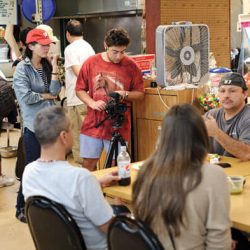Weird World Web
A professor tracks online folklore.
In olden days, when all the lore was folklore, people turned to legends, proverbs, and custom to answer their questions. Nowadays, we’re much more modern and sophisticated. We have the Internet — which, according to Robert Glenn Howard, is full of legends, proverbs, and custom.
Howard, professor of folklore and director of the UW’s digital studies initiative, is using high-tech techniques to track the ways that the web has become a medium for the transmission of folk wisdom. Drawing on network theory, he’s tracing hundreds of thousands of electronic posts to assess how people use online forums to gather what he calls “vernacular authority” to learn things that institutional authority is either unable or unwilling to impart.
“Vernacular authority is a sort of aggregated individual wisdom,” he explains. “It’s authority that is generated from a perceived source of informally shared knowledge. It’s the combination of tradition, folk wisdom, proverbs, and generic experience.”
The web offers a place where vernacular wisdom is not only on display — it’s recorded. Through blogs and posts, the “folk” get a chance to have their say, and any interested party can read it. Further, specialized websites enable users to find exactly the people they want to communicate with, giving them the chance to learn just the facts they want to hear, filtered through a worldview that matches their own. The only problem, Howard has found, is the sheer volume of words that the folk are sharing.
Howard took a sample of that vernacular authority at a website devoted to natural family living — that is, one that caters to parents who are leery of conventional medicine and prefer to raise their children through more traditional practices, sometimes opting for home birth, for instance, or resisting vaccination. He found that there were more than 150,000 individual users who had posted comments on the site, adding up to 5.4 million posts, most running between 50 and 150 words.
“In a lifetime, I couldn’t read all these posts,” he says.
A workshop at UCLA (“Math camp for humanities professors,” Howard calls it) inspired him to hire a computer science graduate student, who designed a program that would help examine large volumes of online posts. The program sifts through multitudes of posts to find connections among users and among terms — such as when the words vaccination, conspiracy, and theory are mentioned together. It then enables Howard to chart those connections and see how vernacular authority operates.
Howard has started applying this technique to other fields of vernacular authority as well, including websites dedicated to women’s issues, political action networks, beliefs about the so-called Mayan apocalypse of 2012, and even the teaching of music — in particular, YouTube videos that purport to show the “correct” way to play the guitar riffs from the 1978 AC/DC song “Gone Shootin’.”
Online, Howard says, “there’s an amazing amount of facts, and people have to figure out which apply and which don’t. People have much more power in what information they consume, for better and worse. That’s why I’m trying to create an ongoing and systematic investigation of digital technology.”
Published in the Fall 2012 issue




Comments
No comments posted yet.